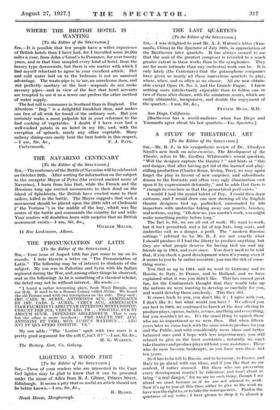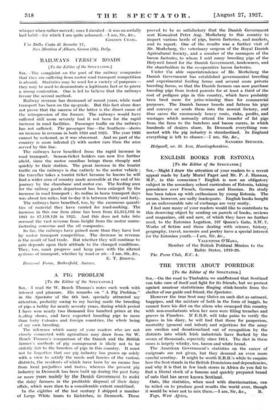A STUDY OF THEATRICAL ART [To the Editor of the
SPECTATOR.] Sin,—Mr. R. J., in his sympathetic review of Dr. Allardyce Nicoll's new book on raise-en-scene, The Development of the Theatre, refers to Mr. Geoffrey Whitworth's recent question, " Will the designer capture the theatre ? " and hints at " this real danger, that after having got rid of the learned and play- stifling production (Charles Kean, Irving, Tree), we may again forget the play in favour of new surprises, and subordinate drama to the fantastic and often very ugly illumination cast upon it by expressionist deformity," and he adds that there is " enough to convince us* that the geometrical peril exists."
I would I had the genial talent of Poy. I could then draw cartoons, and I would draw one now showing all the English theatre designers tied up, padlocked, surrounded by 100 inspectors with umbrellas taking away our pencils, brushes, and notions, saying, "Oh dear no, you mustn't work, you might make something pretty before long."
The fact is, Sir, we are all out of work. We want to work, but it isn't permitted, and a lot of top hats, long coats, and umbrellas call us a danger, a peril. The " modern Russian settings " referred to by Mr. R. J. are not exactly what I should produce if I had the liberty to produce anything, but they are what people deserve for having tied me and my friends Up in 1904, and ever since. You don't need to be told that, if you check a good development when it's young, even if it seems to you to be rather eccentric, you run the risk of some- thing worse.
You tied us up in 1904, and we went to Germany and to Russia, to Italy, to France, and to Holland, and we have explained what it was you didn't like. This has caused great fun, for the Continentals thought that they would take up the notions we were wanting to develop so carefully for you, and would develop them carelessly. This they did.
It comes back to you, you don't like it ; I agree with youi I don't like it ; but what would you have ? We offered you our best in 1904, we continued to knock at the door offering to produce plays, operas, ballets, revues, anything and everything, but you wouldn't let us.: Its the usual thing to squash those who are as impertinent as we were then. But when fifteen years later we came baCk with the same wish to produce for you and the Public, and with considerably more ideas and better balanced ones (and I hope with less impertinence), you still refused to give us the least assistance ; naturally we can't take theatres and produce plays without your assistance. Those who do soon become bankrupts, as you have seen these last ten years.
So it has to be left to Russia, and to Germany, to France, and
Italy to go ahead with our ideas, and if you like that we are content,. if rather amused. But those who arc preventing
every development mustn't be ridiculous and howl about us
being " a real danger," for we are no such thing, though I am afraid we must become so if we arc not allowed to work. Now it's up to you all this time, either to give us the work we have won the riklit to, or to take the consequences. Pardon the quietn6s of my yoke ; I have grown to drop it to almost a
whisper when rather moved ; once I shouted—it was an awfully bad habit—for which I am quite ashamed.—I am, Sir, &c., I' ia Della Costa di Serretto 17, GORDON CRAIG.
San Martino d'Albaro, Genoa (10), Italy.



































 Previous page
Previous page